Sabar Menanti’s nasi padang is literally worth the wait – from beef rendang to ayam bakar
This heritage restaurant impresses Mediacorp Gold 905 DJ Denise with beef rendang, ayam bakar and the story behind its unique name.
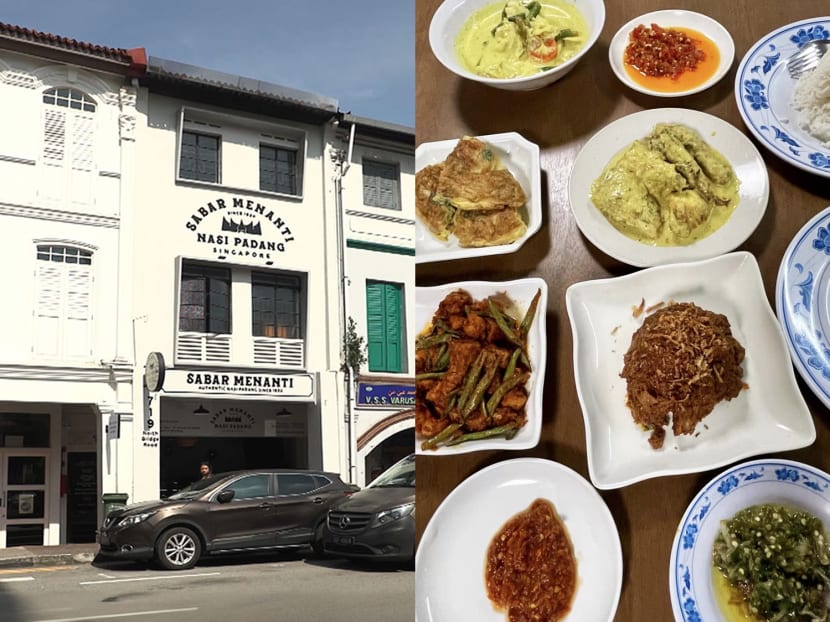
Sabar Menanti at North Bridge Road. (Photos: Mediacorp, Denise Tan)

This audio is generated by an AI tool.
For my next food adventure delving into Singapore’s delicious history, my sights were set on Kampong Gelam, an area renowned for its many nasi padang restaurants.
Named for its West Sumatran city of origin in Indonesia, the Minangkabau dish of steamed rice served with a variety of pre-cooked dishes is a popular choice for time-crunched Singaporeans in need of a satisfying meal. But what is a quick and convenient meal for diners begins with long hours of preparation and cooking.
At nasi padang stalwart Sabar Menanti, the laborious commitment is anchored by a strong dedication to preserving their family’s culinary legacy. It was a happy coincidence then that my colleague and fellow foodie, Class 95 producer-presenter Catherine Robert is a friend of the third-generation owner.

Iszahar Tambunan (Isz) had us meet him at Kandahar Street for a history lesson before we got to taste his family’s famous nasi padang. From what he knows, Sabar Menanti began as a humble pushcart run by his grandparents on that very street corner, opposite a masonry shop that carved tombstones.
“In Malay, we call it ‘batu nisan’. A lot of our customers from overseas didn’t know how to describe the nasi padang so they called us ‘the tombstone nasi padang’, which is ‘nasi padang batu nisan’,” Isz explained.
Contrary to its morbid nickname, “tombstone nasi padang” thrived as word-of-mouth spread. But its present name came from a customer who gave them a sign to display at their bourgeoning food business.
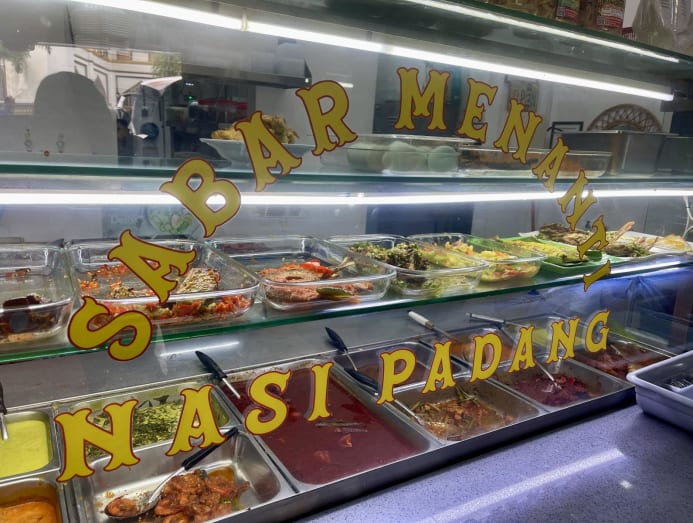
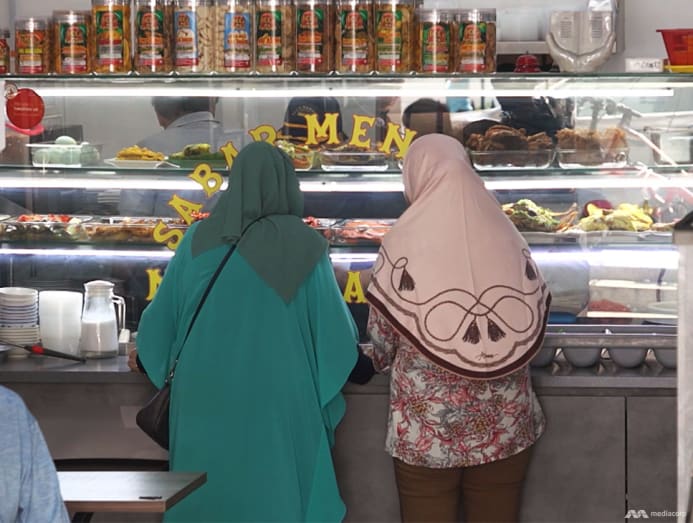
It ended up serving two brilliant purposes – one, as their identifying name and two, for crowd control because Sabar Menanti means “wait patiently.” This came in handy as business and the lines of customers grew. Eventually, the family were able to move from peddling nasi padang on the street into a shophouse on the same street.
“This was probably back in the late 40s, early 50s,” Isz mentioned. For the next few decades, Sabar Menanti flourished in that restaurant on the corner of Kandahar Street. I marvelled at how that small patch, no bigger than a basketball court, held all of his family’s food history.
By the 1980s, Isz’s mother Maryulis Marlian and her siblings were given the responsibility of running the family business, which had expanded to several branches in the area.
Isz has fond memories of riding his bicycle up and down the streets, greeting his elders in the neighbourhood. In fact, another famous nasi padang institution, Rumah Makan Minang, was started by Isz’s aunt (Madam Maryulis’ sister) and now is run by his cousin. As adults, they’ve kept up a familial bond that transcends F&B competition. To Isz, maintaining that kampung spirit has been vital for their successes.
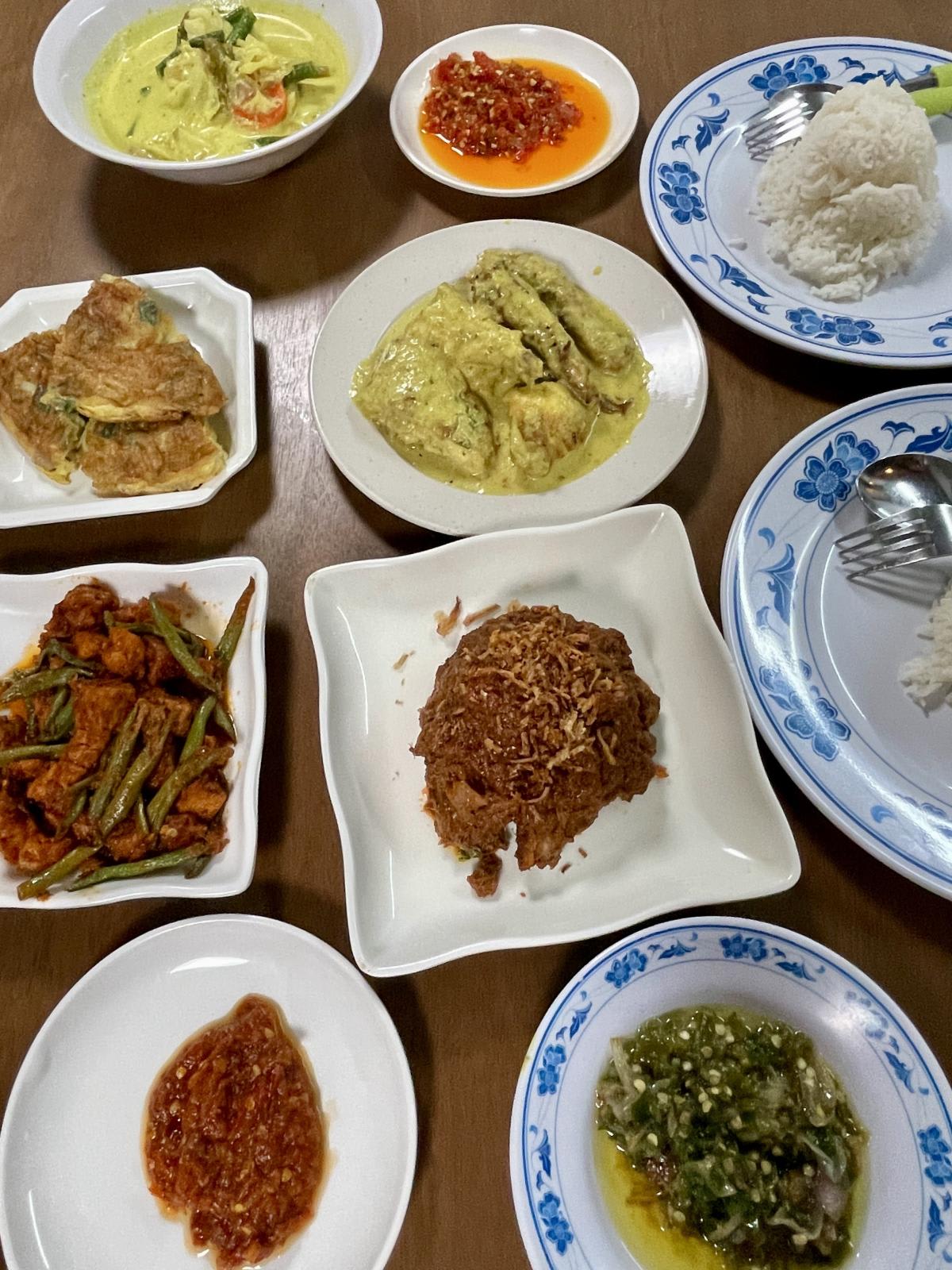
In 1994, Madam Maryulis struck out on her own but stayed close to her beloved community. She opened Sabar Menanti 2 at North Bridge Road, just a 5-minute walk from the site of her parents’ original pushcart. By 2022, hers was the only remaining Sabar Menanti restaurant, so the “2” was dropped and Isz stepped in to help relaunch the family brand.
The new Sabar Menanti opened in October of 2023 and is located in a shophouse just a few doors down on North Bridge Road. Made over in crisp shades of black and white, it now occupies two levels, including the air-conditioned dining space upstairs.
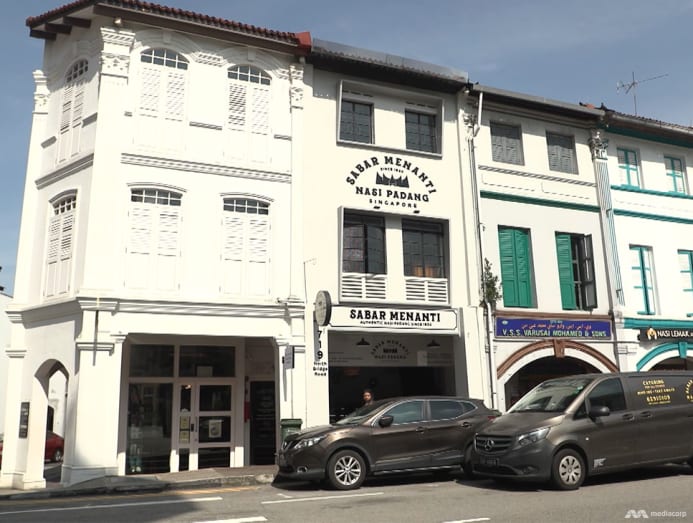

Since officially joining the family business two years ago, Isz has kept busy with overseeing the recent relocation and renovations, as well as managing day-to-day operations. To further elevate the Sabar Menanti Brand, Isz also added a humorous touch to the new staff uniforms – matching black T-shirts emblazoned with catchy one-liners like “Roll me in Rendang”.
Catherine and I were so ready to be “rolled”, but staying true to the restaurant name, we had to keep our rumbling tummies waiting for a while longer. We were scheduled to meet the second generation of Sabar Menanti, Isz’s mother and uncle Lizar Marlian.
Mr Lizar told us that it was always expected that he and his siblings would take over the business.
“Since I left school, I never worked outside. I started working for my mother until now, helping my good nephew,” he said, affectionately clapping Isz on the shoulder. “Actually, we enjoy doing this business. Everybody came to our place so if we stop this business, I think we’ll lose a lot of customers.”
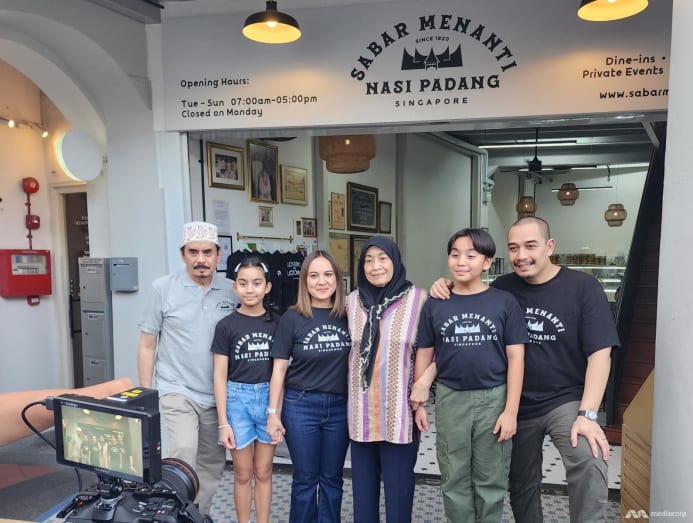
I wondered if Madam Maryulis, like her mother, shared the same expectation for Isz to follow in her footsteps.
“Yeah, because I’m old already. I hoped my son would take over. My business is good! If my son doesn’t take over, who will? I’ve only got one son!” she admitted with a laugh.
“Actually, like every mother, she didn’t want me to be a hawker. She always had this idea that you have a better job, you’re going to have a family, please don’t come into the F&B business, which is very, very labour intensive.” Isz added, although he’s always been on hand to help since his school days, albeit unofficially.
For 12 years, Isz focused on his career as a ship broker, but always with the secret knowledge that one day he would return to helm the family business.
He said: “Towards the last five to six years, my mother had been popping the question ‘what’s going to happen?’. It was during COVID that I could really see that my mother looked very tired, and I decided to just jump into the business.”
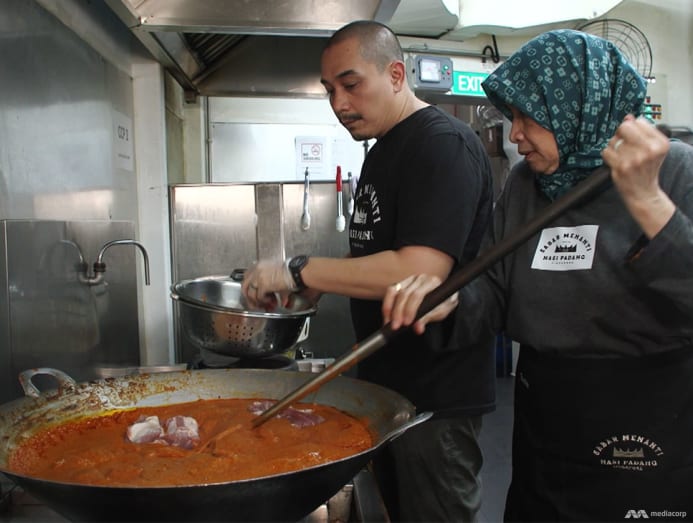
Mr Lizar told us that division of labour had always come naturally to their family, each second-generation sibling performing the tasks they were best at.
“Actually, we are doing what my mother commanded us to do. My sister can cook this, so she’ll cook it. Myself, I take the simpler things like ikan bakar (grilled fish), ayam bakar (grilled chicken), all the bakar (grilled) things. Last time, we used to sell 60 kilos of ikan bakar in one day! Customers even went to the kitchen to reserve the fish!” he reminisced.
As new captain at the helm, Isz is still familiarising himself with kitchen duties, which includes learning to cook his mother’s heritage recipes. Cosmetically, the restaurant has changed, but not the menu. Madam Maryulis continues to ensure the food quality is up to consistent standard.
“Ever since I was young, I was following her into the kitchen, sitting beside her, seeing her doing all the cooking and grilling. My mother is still able to guide me on how to cook so I’m quite fortunate that way,” Isz shared.
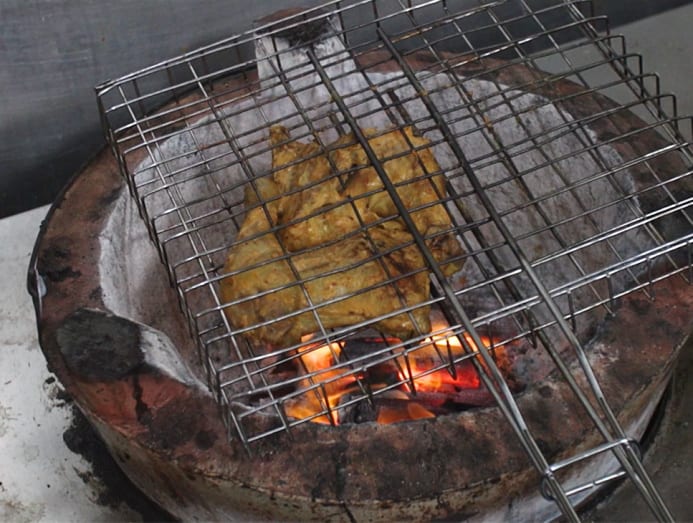
Madam Maryulis said, “I must supervise how he cooks because the taste of the food needs to remain the same. People will know even if there’s just a slight change in taste. The standard of the food must be maintained.”
At their mention of food, our time for waiting patiently was over. Madam Maryulis recommended we try her signature beef rendang and ayam bakar, but we couldn't resist a few other dishes, including sayur lodeh and Catherine’s must-have for every nasi padang meal – sambal goreng.
Unlike any other I've tried before, the ayam bakar came blanketed in a creamy yellow sauce, not quite the crisp-skinned grilled chicken I was expecting.
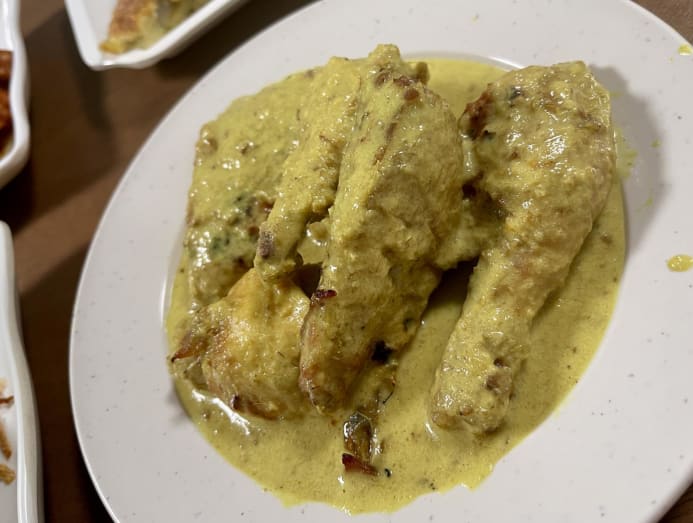

Madam Maryulis explained their Sabar Menanti way: “For ayam bakar, we need to cook it twice. After blanching the chicken with the coconut milk, we then grill it using charcoal. For the curry, we cook it until it becomes concentrated.”
Said curry was the kicker. Spicy, rich and luscious, I could really taste the spices and the coconut milk that had cooked down to a lovely, thick consistency. Peeking through the curry were tempting, charred bits of chicken that had been kissed by the charcoal fire. Down to the bone, the meat was smoky, juicy and flavourful.
The beef rendang was also a winner. The beef chunks had been braised in coconut milk seasoned with lots of herbs and spices until the flavours absorbed and the liquids evaporated.
“Beef rendang is the hardest dish to make as we need to slow cook it for almost three to four hours. We use fresh coconut milk and not the ones from a packet. It requires a lot of spices and you need to keep stirring it,” Madam Maryulis revealed.
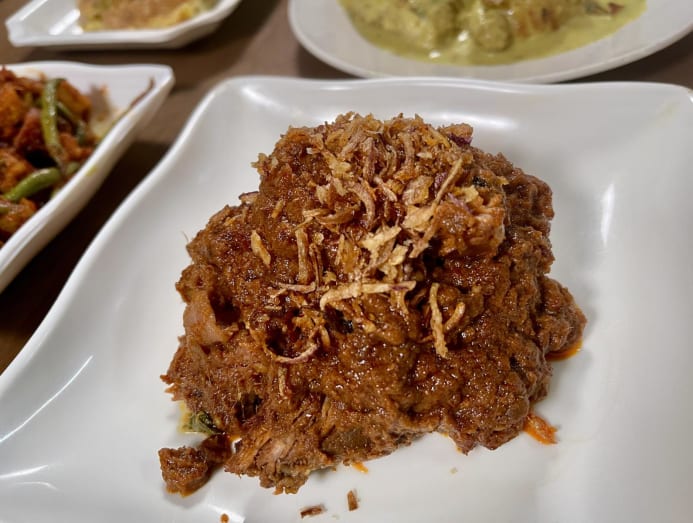
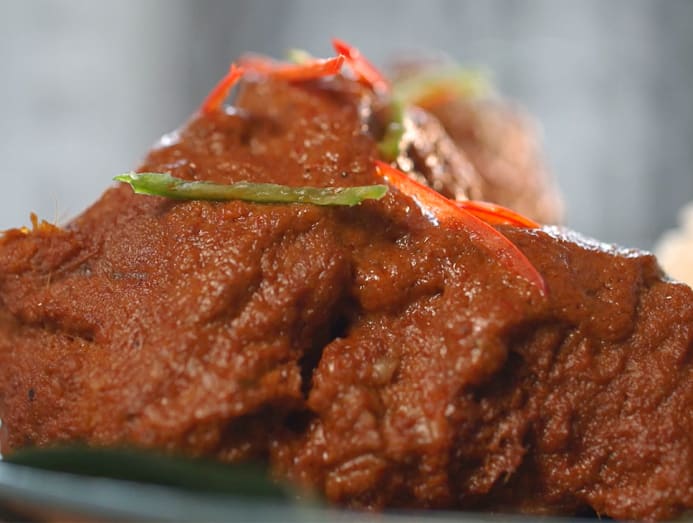
To me, this was a dish that embodied the meaning of “sabar menanti”. Back-breaking patience is needed to condense and caramelise the right balance of taste and texture. The attractive red sheen of the beef promised chilli heat and the generous sprinkle of fried shallots added crunch and fragrance to the showstopper. The savoury beef had been cooked to perfection, fork-tender yet with a satisfying bite.
“All my grandchildren say that the rendang here is number one, the best in the world!” Madam Maryulis exclaimed, beaming with pride.
With so much saucy goodness from the ayam bakar and beef rendang, the all-important ‘nasi’ component of our meal made perfect sense. We also needed lots of steamed white rice to pair with the spicy condiments.
To enhance all the meaty flavours, Sabar Menanti’s trio of chilli pastes were a must. The balado was redolent with red chilli and tomato, a lighter, fruitier contrast to the spicy sambal belacan, packed with the heat of red chillis and the earthy umami of dried shrimp. Then there was the sambal hijau, made from green chillies and onions for a milder, fresher experience. Even eaten alone with rice, their distinct flavours made our tastebuds sing (and sting).
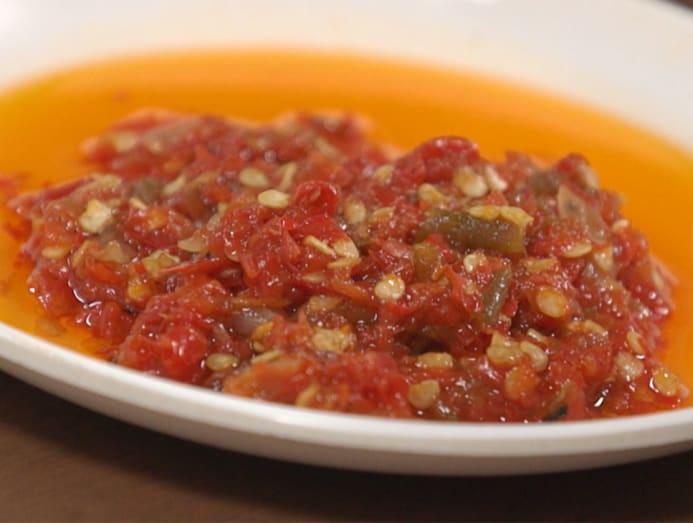
“Craving satisfied,” was Catherine’s verdict. Indeed, from start to finish, our Sabar Menanti experience had been worth waiting for.
According to Madam Maryulis, her son is “fussier” when it comes to quality control. But for Isz, running a tight ship is imperative.
“I just want to bring Sabar Menanti to the next level and we are progressing slowly. And for me, it has to be organic. But eventually, of course I would like to expand, whether it’s going to be a collaboration or opening mini Sabar Menanti in Singapore or outside, it’s in the plans,” he disclosed.
Like his mother and his grandmother before her, Isz harbours some hope that the next generation might be interested in carrying on the family’s legacy. He has already set his 12-year-old twins Isabella and Luca to work on little chores in the restaurant.
“I mean, I’m not forcing them. At the end of the day, it is still up to them. But of course, I get them involved in the business to show them that ‘this is how you guys get your tuition fees’,” he quipped.
Jokes aside, Sabar Menanti has been built on the dreams of parents for decades. From his grandparents to his mother and to him, its full steam ahead for the family who’s guiding philosophy is, according to Mr Lizar, “Do a good deed. We feed others, keep them happy, it’s a blessing for us.”
In turn, I felt blessed. When it comes to Sabar Menanti’s nasi padang, patience is indeed a virtue and good things come to those who wait.
Sabar Menanti is located at 719 North Bridge Rd, Singapore 198687. It's open daily from 9am to 5pm.
Catch Makan Kakis with Denise Tan every Thursday from 11am on Mediacorp GOLD 905.






